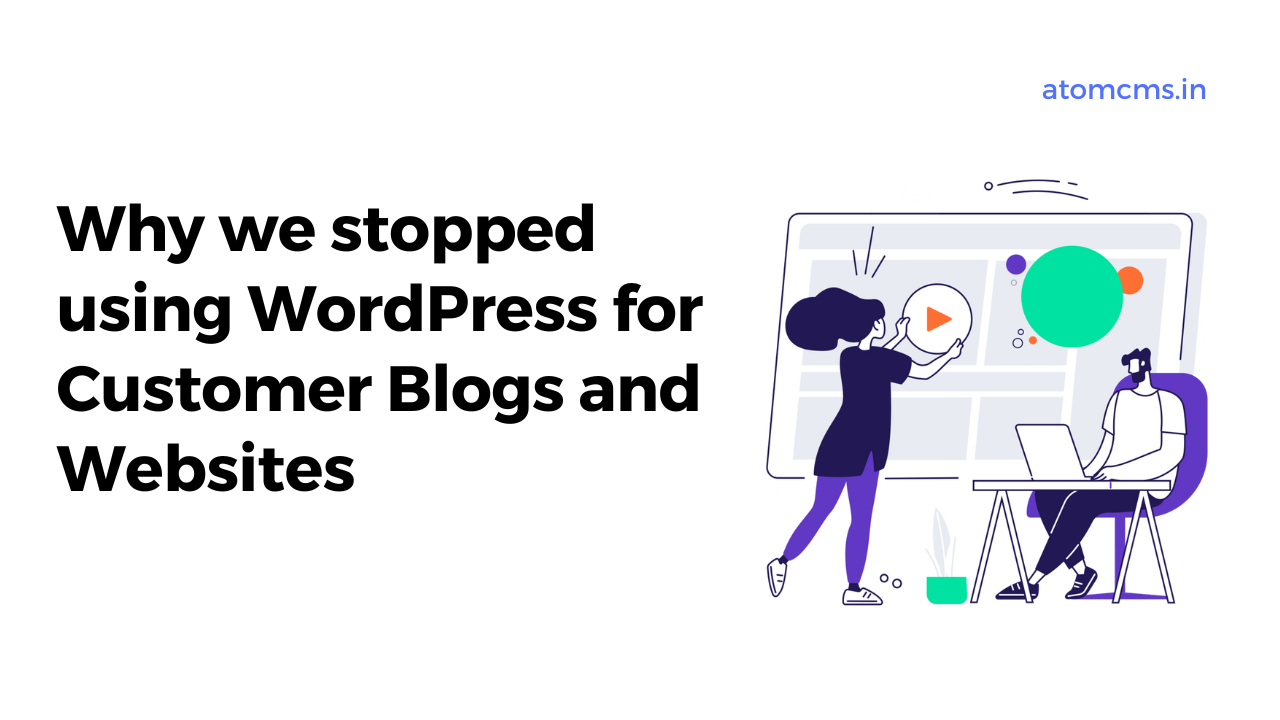WordPress is a popular Content Management System (CMS) that powers millions of websites on the internet. However, despite its popularity, WordPress may not be the best choice for every website. In this post I explain some of the reasons why WordPress we stopped using WordPress for certain customers blogs and websites plus why we built Atom CMS.
Usual Security Concerns
WordPress is a popular platform, and as such, it is vulnerable to cyber threats and hacking attempts. Without proper security measures in place, your website or blog could be at risk of malware, spam, and other malicious attacks. It's important to keep your website up to date with the latest security patches and to choose plugins and themes from reputable sources.
But most of our customers are not tech savvy and don’t have the resources / budgets to keep a tab on this. This caused a lot of websites to go down or suffer performance issues.
Performance Issues
As a CMS, WordPress can be resource-intensive. It heavily relies on its database to function properly. With more content and users, the database can become more resource-intensive. This meant that it was not the best choice for websites that require high performance or have large volumes of traffic such as eCommerce and Heavy Blogs.
The heavy traffic caused website to load slowly and suffered frequent crashes. This negatively impacted the user experience and damage their search engine rankings.
Limited Customization
While WordPress is highly customizable, there may be certain limitations to what you can achieve with it. If you require a completely unique design or functionality, you may find that WordPress is not flexible enough to accommodate your needs. Additionally, custom development for WordPress can be costly and time-consuming.
WordPress themes offer some customisations but that’s usually after you buy their licenses. This is a recurring unknown costs that most clients are not ready for.
Maintenance and Updates
WordPress requires regular maintenance and updates to ensure that it remains secure and functional. If you're not comfortable with performing updates or troubleshooting issues, you may find that WordPress is not the best choice for your website. This led to the need to hire a developer or webmaster to keep your website up to date, which added to the overall cost of running the website.
Overkill for Simple Sites
Perhaps this was one of the main reason why we stopped using WordPress. The flexibility of WordPress is it’s Achilles Heel. The sheer number of plugins, themes and things we can do with WordPress has made it complex and overwhelming, especially for beginners who are not tech-savvy.
The setup process and customization options require some technical knowledge and experience. Most users find it difficult to navigate the platform and make changes to their blog or website. In fact, even some developers and website designers setup a theme with excessive use of plugins without understanding it’s long term effect.
In conclusion, while WordPress remains a popular and effective platform for many bloggers, it may not be the best fit for everyone.
So what did we do
As they say necessity is the mother of invention.
These growing problems faced by our customer led us to find an alternative approach. This led us to come across a concept of Flat File CMS. It was easy to setup, did not require database, was easy to scale and ultimately required low maintenance. We really liked this concept and started working on the idea and came across Bludit CMS - an Open Source Flat File CMS. We signed up for PRO version - started tinkering around and re-worked on certain aspects.
Viola!! Out of the box we could design blogs and websites that are -
- Design and deliver themes which are blazing fast, mobile responsive and SEO friendly.
- As there was no database, their were less points to exploit and made it more secure compared to WordPress.
- We could use it as a content management system for more than blogs and even offer websites design solutions.
- There was no issue of maintenance on the customer part whether it be server or blog. As it could be maintained in-house at a fraction of cost to customers compared to WordPress maintenance.
- With No Code tools, we could easily extend the functionality of the blog which removed the heavy dependence on excessive bloatware such as plugins, themes, widgets, etc.
On Nov 9, 2022 I and my team launched the first version of Atom CMS as a simple alternative to WordPress and launched the first customer website - yatrirailways.com on it. We were able to deliver a fully functional website plus we were able to integrate live local train announcements using APIs. No bloatware, No issues with Page Loading, SEO optimised theme and requires less maintenance effort.
With Atom CMS we aim to deliver a simple, secure and easy to use platform which can be used by our customers for blogs and websites. While blogs can be setup instantly and websites require some coding and technical expertise from our end. But we can guarantee that websites and blogs designed on Atom CMS will be faster than those on WordPress and require no maintenance at your end. So have a go
- Use Atom CMS to create a blog or one page website with blog
- Use Atom CMS+ to create a multi-page website with blog
You may also want to read - WordPress vs Atom CMS Comparison






